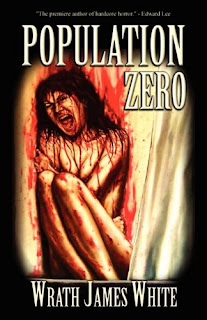
By Livia Llewellyn
Published by Lethe Press (March 15, 2011)
Engines of Desire is comprised of ten stories, including two novellas and two novelettes. It’s stunning enough even without the knowledge that it is Livia Llewellyn’s debut book. Llewellyn, whose catalog of published work stretches back to 2005, has clearly demonstrated more dedication and patience than many of her peers, this reviewer included, and it shows through in every page of Engines.
Several pieces stand out from the pack. The collection leads off with ‘Horses,’ one of the novelettes, which begins as an end-of-the-world tale and finishes as something else entirely. ‘At the Edge of Ellensburg,’ a novella, tells the story of a college girl wrapped up in her addiction to a mysterious, drug-dealing stranger. ‘The Engine of Desire,’ from which the book gets its title, is about a woman’s decades-spanning association with a girl named Kelly who is definitely more than a girl. ‘Take Your Daughters to Work’ can’t really be described in-depth without ruining it, but further demonstrates Llewellyn’s flair for the apocalyptic and otherworldly. ‘The Four-Hundred Thousand’ is a dystopian piece centered around sacrifice and the supposed greater good, as manipulated by the powers that be. ‘Omphalos,’ the other novelette, is an incestuous round-robin affair that’s main character is at least slightly reminiscent of Jack Sawyer from Stephen King’s Talisman.
As a whole, Engines of Desire can be characterized by two overarching themes. The first is the strong erotic overtones (and the occasional subtle undertone) woven through many of the stories. Llewellyn writes hotter and more graphic scenes than the average horror reader is likely to encounter, almost always to the benefit of whichever story such scenes occur in. The second is the sense of otherworldliness present in several pieces; some of it is outright (the chimera in ‘Her Deepness,’ the book’s other novella, for instance), while much of it is more subtle (elements of both ‘The Engine of Desire’ and ‘Omphalos,’ and Kelly in ‘Engines of Desire,’ for instance, will certainly raise some questions).
Engines of Desire is an excellent introduction to a fine, relatively new, author who is sure to develop a rabid following in years to come.
Buy it here.
Review by Lincoln Crisler
Lincoln Crisler's debut novella, WILD, was released in March from Damnation Books. He has also authored a pair of short story collections, Magick & Misery (2009, Black Bed Sheet) and Despairs & Delights (2008, Arctic Wolf). A United States Army combat veteran and non-commissioned officer, Lincoln lives in Augusta, Georgia with his wife and two of his three children. You can visit his website at www.lincolncrisler.info.







